
In an era marked by relentless social scrutiny and the omnipresence of social media, the corporate world, along with public figures, confronts a challenging dilemma: when to voice opinions and when to maintain silence on contentious issues, ranging from geopolitical conflicts to social and political matters.
This decision, far from being straightforward, carries profound implications for brand reputation, public perception, and market positioning.
Let’s look into the complexities and strategies of corporate and public communication in this hyper-connected age, probing into the intricacies and challenges of navigating this intricate landscape, whether it involves speaking out on global crises or addressing more localised social issues.
Corporations today stand at a crossroads, with the interconnected nature of business and the pervasive influence of social media placing them in the spotlight of public and ethical discourse.
Deciding whether to speak up or stay silent on geopolitical conflicts and social issues involves balancing ethical responsibility with business pragmatism.
This choice, influenced by various factors, significantly impacts a company's public image, stakeholder relationships, and financial health. In an era where silence can be interpreted as indifference and speaking out may polarise, corporations must navigate these decisions carefully, considering long-term implications for their reputation and commitment to social responsibility.
Social media's impact and public expectations
Social media's ascendance has transformed corporate communication, drastically accelerating information dissemination and significantly raising public expectations for corporate involvement in social and political issues.
In this digital era, every move by companies is scrutinised, with their actions and inactions equally placed under the microscope. The choice to publicly address geopolitical issues or maintain silence has evolved from an internal strategic decision to a matter of public discourse and spectacle. This increased visibility necessitates a more nuanced and strategic approach, where corporations must balance the complex task of upholding their core values and mission, while adeptly managing public perception and the diverse expectations of their stakeholders.
In this landscape, every communication choice can have profound and far-reaching implications.
Crafting an effective communication strategy amidst geopolitical turbulence demands meticulous attention to several pivotal elements.
First and foremost, any public stance a corporation takes must resonate with its core principles and ethos, ensuring that the message is authentic and maintains consistency with the brand's narrative. Equally important is a nuanced understanding of stakeholder perspectives. This critical aspect goes beyond just considering the views of customers and employees; it encompasses the sentiments of investors, partners, and the broader community.
Understanding and assessing these diverse viewpoints is fundamental to developing an informed and effective communication strategy. Additionally, a thorough risk assessment is indispensable. This involves evaluating the potential risks and benefits of either speaking out or opting for silence. Such an assessment should carefully weigh the implications on the brand's identity, its position in the market, and the value it offers to shareholders.
The case-by-case approach
Adopting a case-by-case approach in corporate communication during geopolitical conflicts acknowledges that each scenario is unique and defies a standardised response. This tailored strategy involves an in-depth analysis of the specific context and subtleties surrounding each issue. Crucial factors, such as the nature and scale of the conflict, the corporation's level of involvement or presence in the affected regions, and its historical responses to comparable situations, significantly influence the formulation of the communication strategy.
Additionally, the cultural, economic, and political climate of these regions also plays a pivotal role. Understanding these intricacies allows for a more targeted and effective communication approach. Flexibility and adaptability are indispensable in this process, considering the dynamic and often volatile nature of geopolitical landscapes.
Corporations must be prepared to swiftly adjust their strategies in response to the evolving situations while maintaining their core values and ethics. This approach not only aids in navigating the immediate challenges but also contributes to building a resilient and responsive communication framework for future scenarios.
Emphasising transparency and engagement
Regardless of the stance taken, transparency and proactive stakeholder engagement are paramount. Clear communication of the reasons behind a particular stance, whether it involves speaking out or maintaining silence, is vital for maintaining trust and credibility.
Furthermore, engaging in constructive dialogues and seeking feedback from stakeholders can facilitate a more empathetic and nuanced approach to handling belligerent issues.
Corporate communication in times of geopolitical conflict is a multifaceted challenge requiring strategic foresight and ethical consideration.
Corporations must balance their brand identity with their social responsibilities and stakeholder expectations, all within a rapidly changing global context. Informed decision-making, grounded in a company's core values and a deep understanding of stakeholder perspectives, is crucial.
By navigating these complexities with strategic acumen and sensitivity, corporations can effectively manage their voice in the global arena, contributing positively to the discourse while safeguarding their reputation and business interests.
(The author is head – marketing communications, CSR and digital, Egis – India and South Asia)


.jpg&h=334&w=500&q=100&v=20250320&c=1)

.jpg&h=334&w=500&q=100&v=20250320&c=1)

.jpg&h=334&w=500&q=100&v=20250320&c=1)



.jpg&h=334&w=500&q=100&v=20250320&c=1)
.jpg&h=334&w=500&q=100&v=20250320&c=1)


.jpg&h=268&w=401&q=100&v=20250320&c=1)

.jpg&h=268&w=401&q=100&v=20250320&c=1)
.jpg&h=268&w=401&q=100&v=20250320&c=1)


